Photographs: B Mathur/Reuters
"A strong message has emerged about the global partnership between the United States and India through President Barack Obama's visit to India," says a senior official in the Prime Minister's Office, summing up the mood in the government.
"The president has added real content to the global partnership. On many issues related to G-20, we are in agreement now," the official added.
It was not easy. It took six months' hard work and more than a dozen visits to-and-from both sides for Washington and New Delhi to make the visit successful, the official pointed out.
On November 8, Prime Minister Manmohan Singh and President Obama met one-on-one without any aide for over an hour. They talked about Pakistan, China, Iran and other major global and regional issues.
At the end of the strategically important visit, the message emerged that India and the US are finding ways of engaging with each other on the global platform and in the Asian arena without disturbing China.
The Indian side claimed that on strategic issues New Delhi got what it aimed for.
Indian government officials are pleased after the Obama visit because of three major achievements.
'The chemistry between Obama, PM already working'
Image: President Obama and Prime Minister Singh at their news conference in New DelhiPhotographs: Jason Reed/Reuters
"Dr Singh and President Obama had met six times before so when they met on November 8, the chemistry between them was already working," continued the official.
"In fact, the age difference between them is working in favour of both leaders. Both are cerebral and both like to think differently on global issues. Both are helping each other to engage."
An Indian diplomat added, "President Obama's visit has put to rest the perception that the Bush administration was more willing to walk with India than the Obama administration."
The PMO official explained the Obama visit thus: Bill Clinton de-hyphenated India and Pakistan from the US point of view; George W Bush showed his readiness to do business with India and made the civil nuclear deal possible; Obama has taken steps to move forward on offers made by Bush.
'India is a friend of America'
Image: Barack and Michelle Obama at the State dinner at Rashtrapati BhavanPhotographs: Jason Reed/Reuters
"President Obama has taken the Indo-US relationship to the next level," said the PMO official.
Despite an electoral hammering at home, America's first couple showed diplomatic verve and personal style in a country known for its tradition of emotional bonding with guests. That showed Obama's charisma, the PMO official said.
"President Obama, through his conduct, speeches and diplomacy, proved to his people and the world that outside America he is very much respected. Americans would notice that India is a friend of America," the official said.
The India-US joint statement issued at the end of the visit proves that India-US relations are not hostage to an individual leader's aura or dependent on their personal ideologies.
The big-bang moment was when on his last evening in India, Obama told Parliament: 'In the years ahead, I look forward to a reformed United Nations Security Council that includes India as a permanent member.'
'We have a tendency to believe the hype'
Image: Policemen confront a demonstrator after a protest in SrinagarPhotographs: Danish Ismail/Reuters
Strategic thinker Brahma Chellaney felt it was 'not really a genuine assurance. In India, we have a tendency to believe the hype.'
Indian officials strongly disagree.
"The US is giving support to India -- for the first time," pointed out the PMO official. "We don't want anything more because we know the US has not shown any serious interest in UN reform. So, where is the question of looking for more?"
"The President has given support for the UNSC bid," he added. "Now, we will have to work with 128 countries that vote for it (UN reforms) and ratify it. We know our steps. He is the American president; he will speak in America's interest. He won't say what you want to hear."
Many Indians felt relieved that on Kashmir, US policy has not changed -- at least publicly.
The PMO official claimed, "He (Obama) knew if he spoke on Kashmir it would destroy his visit. That's the position (of strength) India holds now; 10 years back this was not so."
'It's high time we grow up as a nation'
Image: Activists with an effigy depicting President Obama during a protest in KolkataPhotographs: Rupak De Chowdhuri/Reuters
"On day one, we knew it's business. On day two, it was about people-to people contact. And on the third day it was the political message that would be spread."
The PMO official added: "The critics must remember that these are different times. India is a nuclear power. India spent huge money in Afghanistan and it is sustaining growth since two decades. The world takes you seriously only because of these things."
The official said the government was not at all upset that President Obama did not mention Pakistan at his meeting with relatives of victims and survivors of 26/11 terror attacks or in his written message on the occasion.
"It's high time we grow up as a nation," the official said. "We must have self-esteem and appreciate the dignity of the event. Within an hour of his arrival, when he is trying to emotionally connect to grieving family members, you don't expect politics."
US had to be convinced that India's nuclear liability bill would not affect its companies adversely
Image: Participants with posters of President Obama after a townhall-style meeting in Shanghai, ChinaPhotographs: Jason Reed/Reuters
New Delhi had to work hard in getting major things in the nuclear deal and getting concessions on America's export control on high technology.
Washington had to be convinced that India's nuclear liability bill will not affect American companies adversely because the competitive business deals will still be possible as per the market forces.
Meetings between US officials and Indian lawyers were arranged to explain to Washington that the new law will not jeopardise American companies' business interests. They were told the final contract between suppliers and operators would prevail in court.
President Obama's most telling statement was on America's game plan in Asia. Obama told Parliament, 'India and the United States can partner in Asia. Today, the United States is once again playing a leadership role in Asia -- strengthening old alliances, deepening relationships, as we are doing with China. And we're re-engaging with regional organisations like ASEAN (Association of South East Asian Nations) and joining the East Asia Summit organisations, in which India is also a partner. Like your neighbours in Southeast Asia, we want India to not only 'Look East,' we want India to 'Engage East' -- because it will increase the security and prosperity of all our nations.'
This was the only time Obama mentioned China publicly during his visit to India.
'We are in a new game'
Image: The Osan air base, which belongs to the United States Air Force, located south of SeoulPhotographs: Reuters
Some critics interpreted Obama's statement as intrusive and hinting at containment of China. Government officials in New Delhi strongly protest such an interpretation.
"We are in a new game," said the PMO official. "India has its own China policy and it will move on the basis of that. If America says they are a leader in Asia, let them say it. Even China and India say so. It is a fact that militarily -- with their defence bases in Japan, South Korea, etc -- and economically, America has the biggest presence in Asia; even bigger than China. If the US is doing India's job in Asia, why should we complain?"
Similarly, New Delhi has taken Obama's plainspeak in Parliament about Myanmar and Iran in its stride. Because New Delhi thinks it has a fitting reply ready for the Americans.
"Diplomacy is all about reconciling your differences while safeguarding your interests," explained the PMO official. "He is telling you what he thinks is good for his country. We can also tell the US (about) what they are doing in Pakistan and many other places!"
'We should believe in ourselves first'
Image: The State dinner hosted for the ObamasPhotographs: B Mathur/Reuters
"They think India is not powerful yet. How fragile we are! These people (who criticised Obama for not mentioning Pakistan at the Taj hotel or for mentioning Iran and Myanmar in Parliament) don't know India's intrinsic strength. We should believe in ourselves first," he said.
The most unusual feature for the common Indian was witnessing an American president wooing India for jobs in his country. Critics might say the business deals -- that should create over 50,000 jobs in the US -- were already finalised or in the pipeline. But overall, India felt satisfied with the mixed gains of symbolism and substance.
India was delighted with the joint statement that said the US will support India's full membership in the four multilateral export control regimes -- the Nuclear Suppliers Group, the Missile Technology Control Regime, the Australia Group and the Wassenaar Arrangement -- in a phased manner.
A close reading of the joint statement suggests that there are also structural changes that have taken place during his visit where the interests of two nations on durable factors have been calculated.
'We are not in any end game in Afghanistan'
Image: US Marines carry an injured Afghan national to a helicopter during a mission in southern Afghanistan's Helmand provincePhotographs: Peter Andrews/Reuters
India is in Afghanistan on its own and not because of the US, argue sources in New Delhi. "We are not in any end game! We were there much before America invaded," says a former Indian ambassador to Afghanistan. "We are still there. We have old relations. There was never any doubt that we will continue doing things we are doing in Afghanistan."
On Pakistan, the prickliest issue between India and the US, President Obama had a bumpy ride.
The first bouncer -- to use a cricket metaphor -- was when Afsheen Irani, a 19-year-old student at the townhall meeting at St Xavier's College in Mumbai asked him point blank, 'Why is Pakistan such an important ally of the United States, so much so that America has never called it a terrorist State?'
Obama handled it in characteristic style, saying he was expecting such a question. The crux of his answer was, 'I am absolutely convinced that the country that has the biggest stake in Pakistan's success is India.'
The US will continue dealing with Pakistan the same way
Image: An anti-US protest in Multan, PakistanPhotographs: Damir Sagolj/Reuters
Prime Minister Singh and his National Security Adviser Shiv Shankar Menon also think like Obama and have said the same things before Obama spelled it out.
Not too many Indians agree with their prime minister; instead, Obama's impressive speech in Parliament and the joint statement had the kind of rhetoric on Pakistan most Indians love to hear.
In reality, New Delhi thinks the US will continue dealing with Pakistan the way it has been: It will squeeze Pakistan on one hand by going after rogue elements inside its territory and on the other hand will keep cajoling them because they want to keep the military supply routes to Afghanistan safe.
Pakistan will extract its price in the form of American largesse. New Delhi claims Americans are fully aware of the Indian thinking on Af-Pak issues and they are also aware of the Pakistan military's 'double-crossing' on the Afghan border.
In the India-US joint statement, the governments resolved to further strengthen defence cooperation, including through security dialogue, exercises, and promoting trade and collaboration in defence equipment and technology.
President Obama welcomed India's decision to purchase US high-technology defence items, which the joint statement said 'reflects our strengthening bilateral defence relations and will contribute to creating jobs in the United States.'
More hype than substance?
Image: A US Air Force C-17 aircraftPhotographs: Luke MacGregor/Reuters
"But we must be cautious as all aspects of relaxing this embargo are highly technical and would be worked out in detail later."
The agreement on buying of US C-17 aircraft, Bedi said, would "greatly improve the strategic lift capability of the Indian Air Force, which will also be able to operate these platforms from airfields along the Chinese frontier."
But there are critics who don't buy the Indian government's stance that the Obama visit was successful. They think there was more hype than substance.
Hype is substance!
Image: Chinese Premier Wen Jiabao with Prime Minister Manmohan SinghPhotographs: Damir Sagolj/Reuters
The most interesting pointer to the importance of Obama's visit came from Hanoi, a few days before the Obama visit.
When Chinese Premier Wen Jiabao met Dr Singh on the sidelines of an ASEAN summit, he said on his own, 'I want to visit India this year. Don't listen to what people say. Let us meet and talk. We should settle issues and make relations stronger.'
The senior Indian diplomat said: "This is the play I am talking about!"

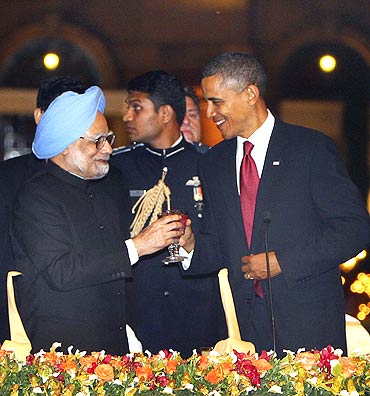
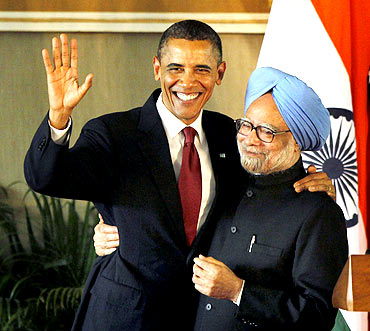
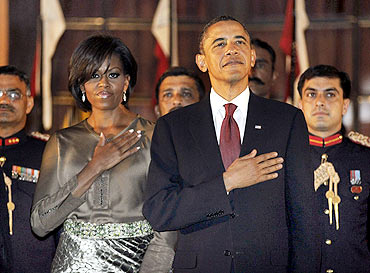
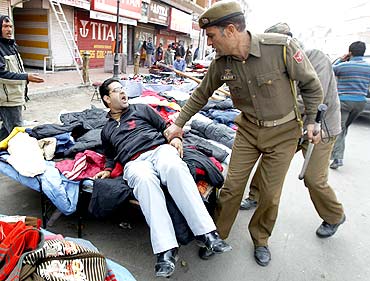
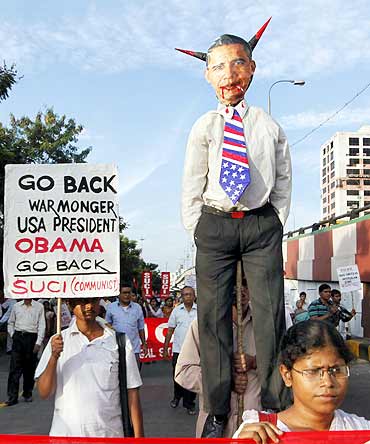
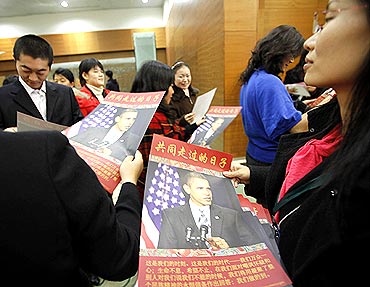
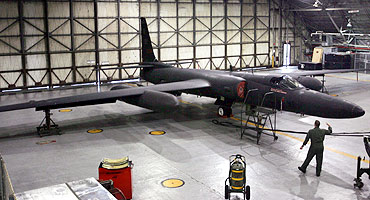
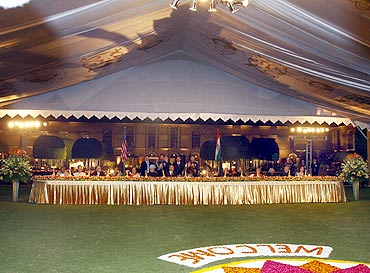
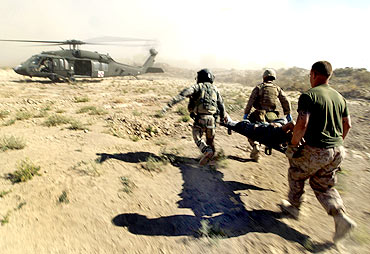
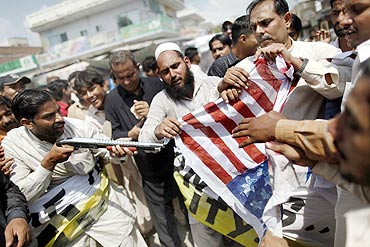
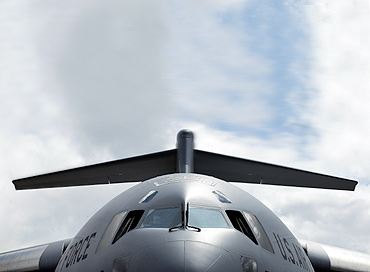
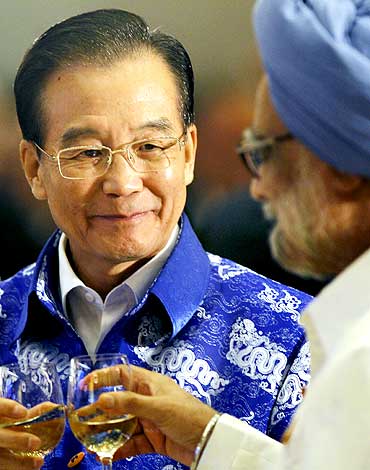
article